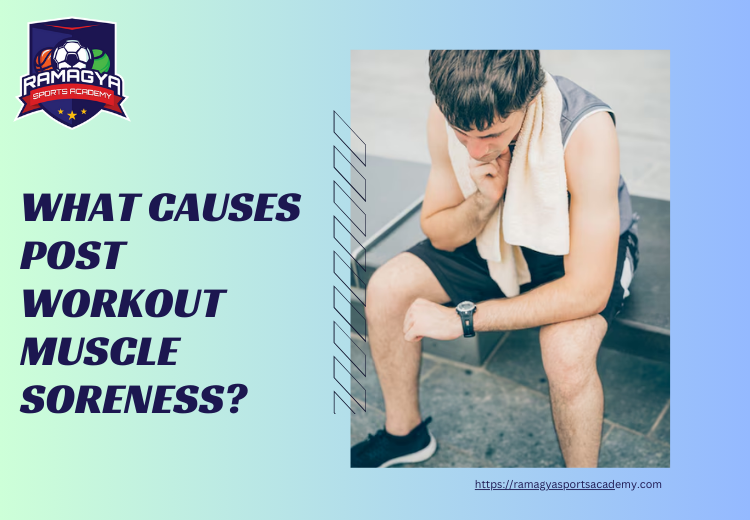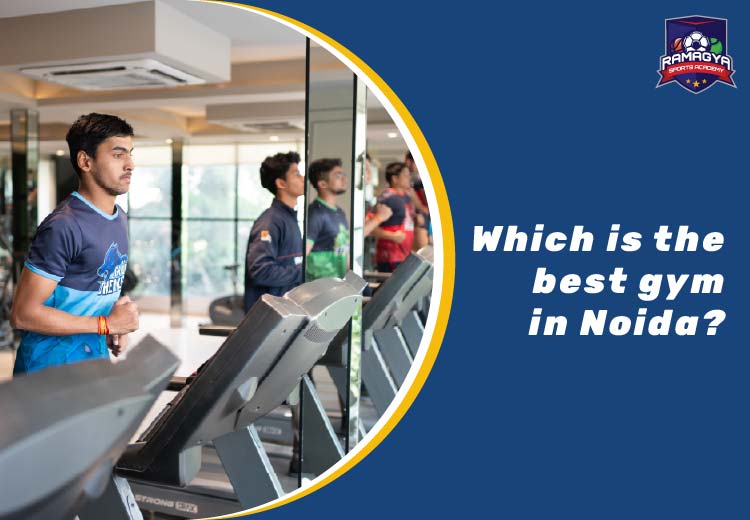
Unlock Flexibility with These 7 Chair Yoga Poses
January 28, 2025
Krishna Tyagi Wins Gold at U.P. Open State Senior Men’s Championship for Basketball
February 19, 2025What Causes Post Workout Muscle Soreness?

If you’ve ever felt sore muscles after a gym session, you’re not alone! Many people experience delayed onset muscle soreness (DOMS) after a tough workout. But what causes this pain? Understanding muscle soreness can help you feel better faster and perform better in your next workout.
What is Muscle Soreness?
Muscle soreness refers to the discomfort that you feel in your muscles following exercising. It typically begins a few hours after exercising and lasts for up to a couple of days. The soreness is triggered when muscles are working harder than normal particularly when you are trying different exercises, or lifting higher weights.
If you exercise, particularly in a new or challenging way, tiny tears develop in the muscle fibers. This is normal! The tiny tears are part of the way your muscles grow and strengthen over time.
What is Delayed Onset Muscle Soreness (DOMS)?
Delayed muscle soreness (DOMS) is the soreness that shows up between 12 and 48 hours after your exercise. As opposed to the pain associated with any injury, DOMS develops gradually and becomes more severe after a couple of days. You may notice a stiffness or tenderness in the muscles you worked during your exercise.
DOMS occurs most often when you perform exercises that are not familiar to your body or which require eccentric movements. They are the exercises that cause your muscles to stretch when they are strained, for example, when you lower a dumbbell gradually when you do a bicep squat.
Why Do Muscles Get Sore After the Gym?
So, what is the reason for sore muscles after a workout? There are several causes for this:
- Micro-tears in Muscle Fibers: If you exercise, particularly when you press your muscles harder than you normally do tiny tears will form within the muscles’ fibers. This is normal and a part of the procedure of constructing stronger muscles.
- Inflammation: Once the muscles tear up and your body is able to heal the tear. The process of healing results in inflammation, which may cause muscles to feel swollen.
- Eccentric Movements: If you exercise in a way that the muscles lengthen under tension (like dropping weights) it could cause more injury to your muscles’ fibers. This is why you could be a bit sore after doing exercises such as squats and lunges.
How to Ease Post Workout Muscle Soreness
Muscle soreness is frustrating, there are simple methods to ease it, and get better faster:
- Rest and Recover: Allow your muscles to heal by taking a break for a few days or even two. Resting doesn’t mean you aren’t able to move, but you should avoid intense exercises that put additional stress on your muscles.
- Moving and Stretching: Gentle stretching and exercises can help improve blood flow to muscles, and speed up recovery. Walking, yoga or swimming could be helpful in relieving discomfort.
- Massage or Foam Rolling: Massaging gently or using a foam roll on muscles that are sore will help them relax and relieve tension. Make sure not to apply too much pressure!
- Stay Hydrated: Drink plenty of water to help in the recovery of your muscles. Drinking water reduces inflammation as well as aids in repair.
- Over-the-Counter Pain Relief: In case, the soreness you feel is uncomfortable, you can take prescribed painkillers available over the counter to ease the pain.
How to Prevent Muscle Soreness
Although you cannot always prevent delayed-onset muscle soreness, there are some things it is possible to do to stop it from becoming painful.
- Warm-up and Cool Down: Make sure you warm up prior to your exercise to prepare your muscles. You can cool down following your workout to help them in their recovery.
- Start Slowly: If you’re trying new exercises or lifting heavier weights, ease into it. Gradually increase the intensity of your workouts to allow your muscles to adjust.
- Make Sure you take Rest: The importance of rest days is to recover. Do not push your muscles too hard every day, since this could result in more soreness and even injury.
- A Healthy Diet: Having well-balanced meals that are full of fats and proteins, and carbs can help with the growth of muscles and recoveries as well as reducing soreness.
Conclusion
Muscle soreness is a normal part of exercising, especially if you’ve pushed your muscles harder than usual. Delayed onset muscle soreness (DOMS) usually happens 12-48 hours after a workout, and while it can be uncomfortable, it’s a sign that your muscles are getting stronger. By understanding why you get sore, you can take steps to recover quickly and prevent excessive pain. So, next time you feel sore, remember it’s part of the process of getting fitter and stronger!



